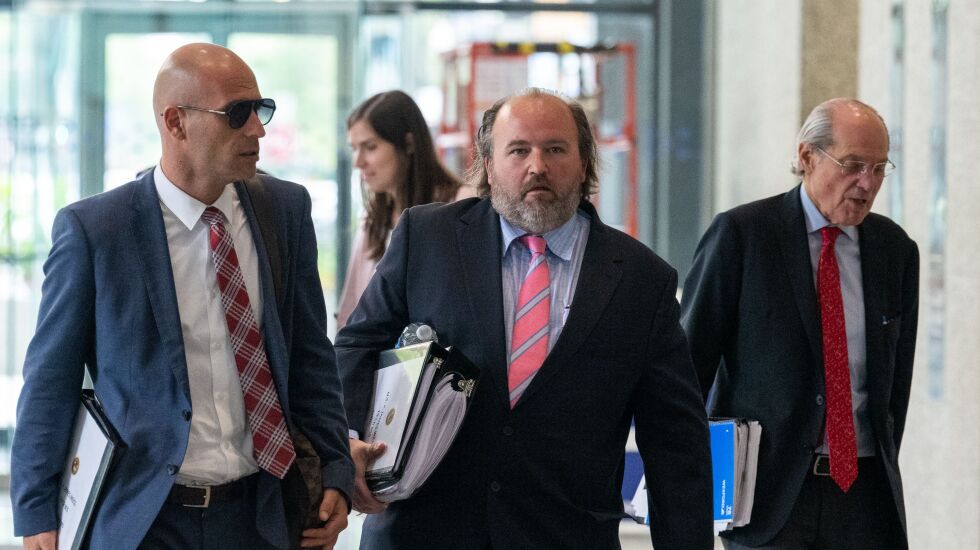
A lawyer for businessman James Weiss insisted to a federal jury Tuesday that his client operated legally on the outskirts of an old-school bribery scheme between two state lawmakers who never filled him in on their shady deal — which was really an FBI ruse.
In doing so, defense attorney Sheldon Sorosky quickly highlighted what is expected to be a crucial issue as Weiss’ federal bribery trial gets underway: The absence of one of the two lawmakers, former state Rep. Luis Arroyo, from the witness stand.
Weiss is accused of bribing Arroyo and then-state Sen. Terry Link, both Democrats, to advance legislation in the Illinois General Assembly related to unregulated gambling devices known as sweepstakes machines. Weiss’ trial began in earnest Tuesday with opening statements after lawyers selected a jury of eight women and four men.
The trial’s most substantive day could come Wednesday. Jurors might hear from Link, the star witness who wore a wire on Arroyo for the FBI. Also expected to take the stand are state Rep. Robert “Bob” Rita and former state Sen. Antonio “Tony” Munoz.
Weiss, a son-in-law of former Cook County Assessor Joseph Berrios, is charged with wire fraud, mail fraud, bribery and lying to the FBI.
Assistant U.S. Attorney Christine O’Neill spent about 15 minutes laying out the case to jurors Tuesday, alleging that Weiss bribed Arroyo and Link and then lied to the FBI about it, even claiming he’d spoken to a fictional “ghost of a person” named “Katherine Hunter” who was invented by the FBI as part of their investigation.
Then Sorosky took his turn, using nearly an hour to explain away allegations first leveled against his client in October 2020. Among them is the claim that Weiss paid $32,500 in bribes to Arroyo, who then pushed the sweepstakes legislation in the General Assembly.
Arroyo pleaded guilty in November 2021 and is serving a nearly five-year prison sentence handed down by U.S. District Judge Steven Seeger, who is presiding over Weiss’ trial. Prosecutors have confirmed that Arroyo will not testify, and Sorosky last week told Seeger that would be a “critical fact” in the case.
Sorosky then seemed to take full advantage of Arroyo’s absence Tuesday, telling jurors that prosecutors would fail “to prove beyond a reasonable doubt” that the payments Weiss made to Arroyo were bribes and not “legitimate consulting fees.”
Sorosky explained how Weiss learned of plans by then-Chicago Ald. Patrick O’Connor (40th) to push an ordinance that would ban sweepstakes machines in the city. Weiss hired Arroyo as a lobbyist to help block it, Sorosky said.
“Arroyo must have done something right because sweepstakes were never banned,” Sorosky said, adding that “Weiss got a good bang for his buck.”
Though Sorosky acknowledged that Arroyo also approached two state lawmakers — Rita and Munoz — he said “Arroyo didn’t offer those two other legislators any bribe or anything like that.”
Still, Weiss also hoped to pass sweepstakes legislation in the Illinois General Assembly. When his bill didn’t go anywhere, Sorosky said Weiss asked Arroyo to set up a meeting with Link, a key legislator on gaming.
“That’s not a crime,” Sorosky said.
But it turned out that Link had been cooperating with the FBI in hopes of catching a sentencing break for his own tax crimes, for which he has since pleaded guilty. Link wore a wire when the three men met at a Wendy’s restaurant in Highland Park in August 2019.
That’s where Sorosky said Link told Arroyo, “I want to talk to you alone outside.”
When the two men stepped outside, Link asked “what’s in it for me?” Arroyo explained that he was being paid $2,500 a month as a consultant, and the same could be arranged for Link. Sorosky pointed out that it all happened “outside the hearing and presence of Jim Weiss.”
“Weiss is glad Link was wearing that tape recording device,” Sorosky said. “Because that tape recording device says — will show you — that Weiss did not commit any crimes in that conversation and did not offer any bribes.”
Sorosky also insisted that “Arroyo never told Weiss about Link’s proposed bribe or anything like that.” Arroyo and Link met again nearly three weeks later, when Arroyo gave Link a $2,500 check from Weiss’ business, Collage LLC, at a Skokie pancake house. Link told Arroyo to make the check out to Katherine Hunter, the fictional person invented by law enforcement.
Weiss later told the FBI he’d spoken by phone to Katherine Hunter — one of the alleged lies for which he is charged. But Sorosky told jurors that Weiss thought she was real, and that he thought Arroyo had once put him on the phone with her in a brief, quickly disconnected phone call.







